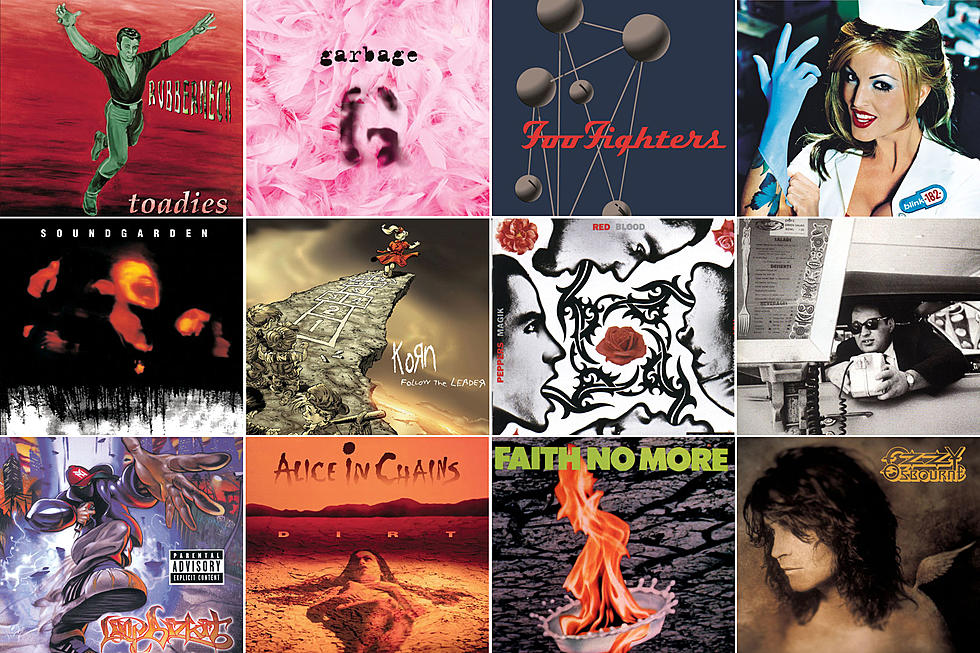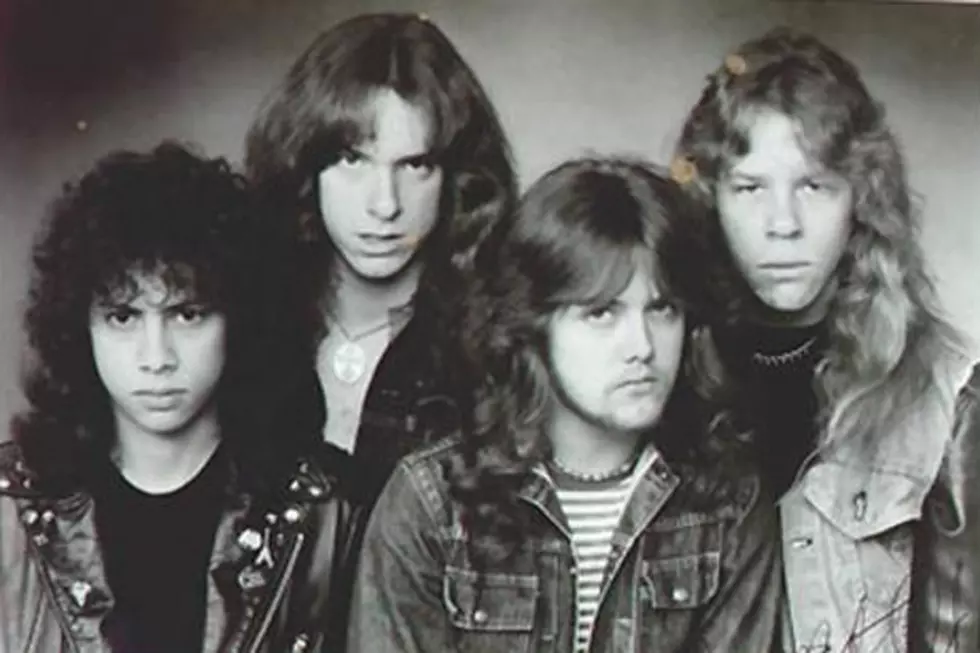
How Metallica Became Superstars With the Black Album
Metallica closed out the '80s as rock's reigning thrash metal band, but far from being content to rest on their laurels, they forged a different path for their fifth album — and rocketed to an incredible new level of mainstream success in the bargain.
Sessions for the record started in the fall of 1990, with producer Bob Rock — whose previous credits included Mötley Crüe's No. 1 hit Dr. Feelgood — behind the boards. While the band had certainly enjoyed its share of hits in the years leading up to this project, hiring Rock seemed to signal that Metallica were consciously setting out to court the mainstream — something they understood, and scoffed at, even before the album was out.
"People will be saying Bob made Metallica sound like Bon Jovi," predicted James Hetfield in a joint interview with Kirk Hammett conducted by Guitar World in 1991. "They don't realize that no one screws with us, except us. Bob fit right into the program and the direction we were going."
"We wanted to create a different record and offer something new to our audience. I hate it when bands stop taking chances," added Hammett. "A lot of bands put out the same record three or four times, and we didn't want to fall into that rut."
"They had broken through to one level, but they still weren’t on mainstream radio," Rock told Music Radar. "When they came to me, they were ready to make that leap to the big, big leagues. A lot of people think that I changed the band. I didn’t. In their heads, they were already changed when I met them."
Those changes caught up with fans on Aug. 12, 1991, when the new self-titled effort — informally referred to as the Black Album due to its nearly featureless black cover — arrived in stores. Even though the lead-off single, "Enter Sandman," proved Metallica had lost none of their trademark snarling swagger, the band's sound had definitely changed in some very noticeable ways. There was no arguing with the muscle and polished heft Rock brought to the group's historically rather muddy sonics, and the songs boasted plenty of the live feel that he and the band members had painstakingly assembled over a grueling period of months. But they were also shorter, leaner and more varied — and not everyone appreciated the evolution.
"I've run into fans who think the album's crap," grumbled Hammett in a 1991 interview with Rolling Stone. "Friends of mine who are really hardcore fans have said, 'Well, the album's not as heavy. You guys aren't as heavy as you used to be.' I go, 'Man, you're trying to tell me 'Sad But True' isn't heavy? 'Holier Than Thou' isn't heavy? How do you define heavy?'"
"Kids come up and say, 'How come you don't do Kill 'Em All again?'" added Hetfield. "And I go, 'Yeah, I like that album too. But there's more to our music than that.' We can still do it live, and when we play it, we mean it, man. But we have those songs in the set already. And they'll be there for the life of the band. But sitting there and worrying about whether people are going to like the album, therefore we have to write a certain kind of song – you just end up writing for someone else. Everyone's different. If everyone was the same, it would be boring as shit."
If the new songs didn't thrash as hard as their predecessors, the new album was heavier in at least one respect: Rock's production took a much more dynamic approach to the music, allowing the instruments more room to breathe — particularly Jason Newsted's bass, which had been all but squeezed out of the mix during their previous effort, 1988's ...And Justice for All.
"Bob really helped us with orchestrating and bringing out the low end — getting the guitar and bass to work together," Hetfield told Guitar World. "In fact, when I played the album for a friend, he asked, 'What is that weird low end sound?' I said, 'That's something new for us — it's called bass!'"
Watch Metallica Perform 'Enter Sandman'
The fatter bottom end fans heard on the Black Album was coupled with a change in the way drummer Lars Ulrich approached his own contributions to the tracks.
"I noticed that Lars played to James’s guitar, much like the way that Keith Moon played to Pete Townshend. That’s fine for some bands, but not every one," Rock explained. "Lars wanted Metallica to groove more. AC/DC’s Back in Black was a big reference point as a rock record that grooved. I told him that in order to get that feel, he had to be the focal point musically. So on certain songs, the band played to Lars. They followed him. It made a real difference."
Newsted's bass wasn't the only new sound that filtered into the mix — Rock also encouraged the group to add an assortment of other sonic touches, including sitar and cello, and allowed them free rein to experiment with more melodic material like the eventual hit "Nothing Else Matters," which found Hetfield tapping into a whole new side of his singing skills.
"It's absolutely crazy, that was the song that I thought was least Metallica, least likely to ever played by us, the last song anyone would really want to hear. It was a song for myself in my room on tour when I was bumming out about being away from home," Hetfield later told the Village Voice. "I'm grateful that the guys forced me to take it out of my tape player and make it Metallica."
By the time the Black Album had finished running its course on the charts, "Metallica" meant a lot of different things to a whole bunch of new fans. At 16 times platinum and counting, it's far and away the band's bestselling release — a No. 1 hit that forever changed their place in metal, whether they wanted it to or not. Once angry outsiders, they emerged major fixtures on the pop culture landscape.
"It's just numbers," Ulrich shrugged, "on a fucking piece of paper." Still, he conceded, there was a certain pride that came with bringing a style of music from the underground into the mainstream.
"I know we're No. 1 completely on our own terms," he continued. "This whole thing was done our way. There is an inner satisfaction about that, to give a major 'Fuck you' to the business itself and the way you're supposed to play the game and the way we dealt with all that shit up through the mid-'80s."
That success would alter Metallica's future trajectory in any number of ways, overshadowing the band's later efforts to continue branching out from its sound and eventually serving as a sort of fulcrum for fans who continue to see the Black Album as the point where the group changed — for better and for worse. Still, as torturous as the sessions may have been, and as complicated as the record's legacy may have proven, the songs captured something they — and Rock — have returned to repeatedly over the years.
"It wasn’t a fun, easy record to make. Sure, we had some laughs, but things were difficult," Rock told Music Radar. Not knowing at the time that they'd reunite more than once during the ensuing decades, he recalled, "I told the guys when we were done that I’d never work with them again. They felt the same way about me."
Top 50 Classic Heavy Metal Albums
Metallica Released One of Rock’s Most Hated Albums
More From KKTX FM










